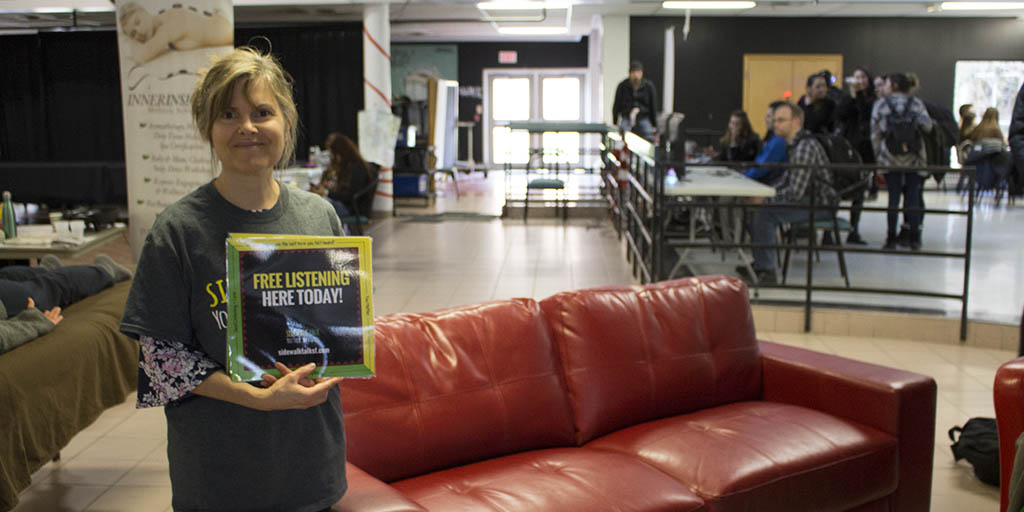Peer Support offers students a seat with Sidewalk Talk initiative
 CREDIT: ANGELA MCINNES
CREDIT: ANGELA MCINNESTerri DeCaire is one of the student peer support volunteers to lend an ear in Fanshawe's Counselling & Accessibility's Sidewalk Talk sessions.
Amid the bustling festivities of the Fanshawe Student Union’s (FSU) Chill Lounge in Forwell Hall earlier last week, were two comfy red sofas tucked to the side of the room.
It was here that students could settle in and vent to Student Peer Support Volunteers as part of their Sidewalk Talk initiative.
“When you listen to someone, their story evolves and they come to their own conclusions and you're a person to support that process. It sounds so simple, yet it’s very magical,” Terri DeCaire, a volunteer with Fanshawe’s counselling & accessibility services, said.
DeCaire has been a part of Sidewalk Talk since it began in the fall. So far, the program has held two-hour sessions during Chill Lounges, Health and Wellness Fairs or Canadian Mental Health Association (CMHA) Crisis Service events. Students can sit down and chat with volunteers trained in Mental Health First Aid, Safe-Talk (suicide awareness), confidentiality, communication skills, active listening, crisis intervention, boundaries, Anti-Oppressive Practice, and resources both on and of campus.
The business payroll and bookkeeping student said that the program’s mission is to provide students with an opportunity to vent, in a healthy way, as they grapple with stress.
“There is a psychological tool, called emptying your yucky bucket, which is all those negative emotions. You feel them, but don't have time to process them, so they build and sometimes one last little negative thing happens and suddenly your yucky bucket is spilling over and you seem to be overreacting to the situation,” DeCaire said. “I see Sidewalk Talk as a reminder to everyone that yeah, just share what's going on with you. It empties that yucky bucket a little bit so you can become aware of yourself, ease some of your burden and be able to move forward in a little bit of a lighter step because you've shared and you've vented.”
DeCaire said that the response to Sidewalk Talk has been positive, although people tend to be timid at first. Even so, the initiative has proven to be a useful resource to help students talk out their problems and find ongoing supports available throughout the school year.
“There are a variety of different supports that students can access, on campus, in our community, online such as WellTrack, and phone,” Ashley Cochrane, case management and peer program facilitator at Fanshawe’s Counselling and Accessibility Services, said in an email to Interrobang. “I would encourage students to access the 24/7 crisis and support lines, namely CMHA's Reach Out and GoodToTalk, which is specific to post secondary students. If you are in crisis, you can drop into CMHA's crisis service at 648 Huron Street 24/7 to meet with a Crisis Worker, or go to Victoria Hospital if it's an emergency.”
Cochrane also suggested reaching out to campus security, residence staff and student health services, as well as reaching out to a counsellor, CMHA worker or student peer support volunteer, like DeCaire.
“My family and I have had quite a long tangled journey with the mental health system and definitely have learned a lot. I wanted to be able to give back because I think part of the challenges of getting mental health support is realizing that there are many doors you can knock on, but it may not be the exact match for what you need. So you have to persevere at a time when you [are] probably mentally and emotionally not feeling like you have the capability to do so,” DeCaire said. “Peer supports ease that burden to make it easier to connect with the support that's right for you. My advice is to keep trying.”
















